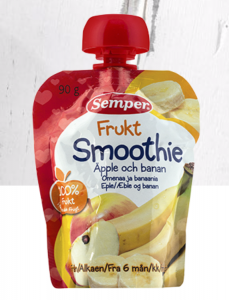 I en artikel från tyska läkare publicerad i Molecular and Cellular Pediatrics (och pubmed) avråds föräldrar att ge sina barn så kallade klämmisar. De har en hög koncentration av energi som i huvudsak kommer från socker. Och barnen missar det viktiga tuggandet, samt att lära sig att äta mat med olika konsistens. Det här kan i sin tur påverka allt från framtida matintag, till käkpartiets utveckling och förmåga att andas korrekt (min kommentar).
I en artikel från tyska läkare publicerad i Molecular and Cellular Pediatrics (och pubmed) avråds föräldrar att ge sina barn så kallade klämmisar. De har en hög koncentration av energi som i huvudsak kommer från socker. Och barnen missar det viktiga tuggandet, samt att lära sig att äta mat med olika konsistens. Det här kan i sin tur påverka allt från framtida matintag, till käkpartiets utveckling och förmåga att andas korrekt (min kommentar).
“Abstract
Pureed complementary feeding products packed in squeezable plastic pouches, usually with a spout and a screw cap, have been increasingly marketed. The Committee on Nutrition recommends that infants and young children should not suck pureed or liquid complementary foods from baby food pouches. Complementary foods should be offered with a spoon or should be fed as finger foods. Infants and young children should be given the opportunity to get to know a variety of foods and food textures including pieces of foods, supported by responsive feeding between the child and their parents or caregivers. Complementary foods marketed in baby food pouches often have a high energy density and are predominantly extremely high in sugar content, with up to almost 90% of the total energy content. Regular consumption bears the risks of imbalanced nutrient provision and increased risks for dental caries and overweight. Complementary foods for infants and young children should have a balanced composition following the recommendations of the German Society of Pediatrics and Adolescent Medicine (DGKJ) and should contain only limited amounts of sugar. We discourage the feeding of pureed complementary foods from baby food pouches.”
“this may delay or hinder learning to eat from a spoon or learning to eat finger foods [9]. The exploration of foods with the lips, tongue, and the hands as well as the practice of chewing can be impaired. Some observational studies indicate a potentially limited window of opportunity for favorable introduction of solid foods.”
“The typical composition of baby food pouches raises serious concerns. Product claims that are perceived positively by parents are often brought to the forefront, for example, natural or organic ingredients, the absence of artificial additives, gluten, or lactose, or the vegetarian or vegan characteristics of the product. However, many of these products have a high energy density, a very sweet taste, and a totally unbalanced nutritional composition with sugar contents that are too high.”
“energy contents between 38 and 89 kcal/100 g product (median 60 kcal/100 g; 75th percentile 66 kcal/100 g; 90th percentile 75 kcal/100 g) and sugar contents between 40.0% and 88.9% of energy content (E%) (median 70.1 E%; 75th percentile 78.7 E%; 90th percentile 83.3 E%). Baby food pouches on offer contain predominantly sweet pureed fruit preparations. Even products with the claim of the content of cereals, vegetables, or dairy products are very sweet and have too high a sugar content.”
Även Ann Fernholm har skrivit om artikeln.

Lämna ett svar